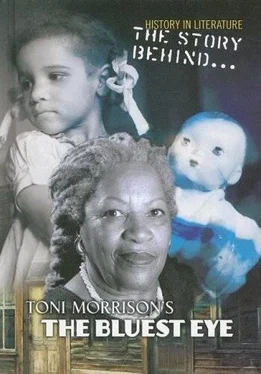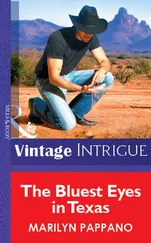"You heard me. Where your socks? You as bare-legged as a yard dog."
"I couldn't find any."
"Couldn't find any? Must be somethin' in your house that loves socks." China chuckled. Whenever something was missing, Marie attributed its disappearance to "something in the house that loved it."
"There is somethin' in this house that loves brassieres," she would say with alarm. Poland and China were getting ready for the evening. Poland, forever ironing, forever singing. China, sitting on a pale-green kitchen chair, forever and forever curling her hair. Marie never got ready. The women were friendly, but slow to begin talk. Pecola always took the initiative with Marie, who, once inspired, was difficult to stop.
"How come you got so many boyfriends, Miss Marie?"
"Boyfriends?
Boyfriends? Chittlin', I ain't seen a boy since nineteen and twenty-seven."
"You didn't see none then." China stuck the hot curlers into a tin of Nu Nile hair dressing. The oil hissed at the touch of the hot metal. "How come, Miss Marie?" Pecola insisted. "How come what? How come I ain't seen a boy since nineteen and twenty-seven? Because they ain't been no boys since then. That's when they stopped. Folks started gettin' born old."
"You mean that's when you got old," China said. "I ain't never got old. Just fat."
"Same thing."
"You think 'cause you skinny, folks think you young? You'd mak a haint buy a girdle."
"And you look like the north side of a southbound mule."
"All I know is, them bandy little legs of yours is every bit as old as mine."
"Don't worry 'bout my bandy legs. That's the first thing they push aside." All three of the women laughed. Marie threw back her head. From deep inside, her laughter came like the sound of many rivers, freely, deeply, muddily, heading for the room of an open sea. China giggled spastically. Each gasp seemed to be yanked out of her by an unseen hand jerking an unseen string. Poland, who seldom spoke unless she was drunk, laughed without sound. When she was sober she hummed mostly or chanted blues songs, of which she knew many. Pecola fingered the fringe of a scarf that lay on the back of a sofa. "I never seen nobody with as many boyfriends as you got, Miss Marie. How come they all love you?" Marie opened a bottle of root beer. "What else they gone do? They know I'm rich and good-lookin'. They wants to put their toes in my curly hair, and get at my money."
"You rich, Miss Marie?"
"Puddin', I got money's mammy."
"Where you get it from? You don't do no work."
"Yeah," said China, "where you get it from?"
" Hoover give it me. I did him a favor once, for the F. B. and I."
"What'd you do?"
"I did him a favor. They wanted to catch this crook, you see. Name of Johnny. He was as low-down as they come…"
"We know that." China arranged a curl. "… the F.B. and I. wanted him bad. He killed more people than TH. And if you crossed him? Whoa, Jesus! He'd run you as long as there was ground. Well, I was little and cute then. No more than ninety pounds, soaking wet."
"You ain't never been soaking wet," China said. "Well, you ain't never been dry. Shut up. Let me tell you, sweetnin'. To tell it true, I was the only one could handle him.
He'd go out and rob a bank or kill some people, and I'd say to him, soft-like, 'Johnny, you shouldn't do that.' And he'd say he just had to bring me pretty things. Lacy drawers and all. And every Saturday we'd get a case of beer and fry up some fish. We'd fry it in meal and egg batter, you know, and when it was all brown and crisp-not hard, though-we'd break open that cold beer…" Marie's eyes went soft as the memory of just such a meal sometime, somewhere transfixed her. All her stories were subject to breaking down at descriptions of food. Pecola saw Marie's teeth settling down into the back of crisp sea bass; saw the fat fingers putting back into her mouth tiny flakes of white, hot meat that had escaped from her lips; she heard the "pop" of the beer-bottle cap; smelled the acridness of the first stream of vapor; felt the cold beeriness hit the tongue. She ended the daydream long before Marie. "But what about the money?" she asked. China hooted. "She's makin' like she's the Lady in Red that told on Dillinger. Dillinger wouldn't have come near you lessen he was going hunting in Africa and shoot you for a hippo."
"Well, this hippo had a ball back in Chicago. Whoa Jesus, ninety nine!"
"How come you always say 'Whoa Jesus' and a number?" Pecola had long wanted to know. "Because my mama taught me never to cuss."
"Did she teach you not to drop your drawers?" China asked. "Didn't have none," said Marie.
"Never saw a pair of drawers till I was fifteen, when I left Jackson and was doing day work in Cincinnati. My white lady gave me some old ones of hers. I thought they was some kind of stocking cap. I put it on my head when I dusted. When she saw me, she liked to fell out."
"You must have been one dumb somebody."
China lit a cigarette and cooled her irons. "How'd I know?" Marie paused. "And what's the use of putting on something you got to keep taking off all the time? Dewey never let me keep them on long enough to get used to them." Dewey who?" This was a somebody new to Pecola.
"Dewey who? Chicken! You never heard me tell of Dewey?" Marie was shocked by her negligence. "No, ma'am."
"Oh, honey, you've missed half your life. Whoa Jesus, one-ninety! You talkin'
'bout smooth! I met him when I was fourteen. We ran away and lived together like married for three years. You know all those klinker-tops you see runnin' up here? Fifty of 'em in a bowl wouldn't make a Dewey Prince ankle bone. Oh, Lord. How that man loved me!" China arranged a fingerful of hair into a bang effect.
"Then why left you to sell tail?"
"Girl, when I found out I could sell it-that somebody would pay cold cash for it, you could have knocked me over with a feather." Poland began to laugh.
Soundlessly. "Me too. My auntie whipped me good that first time when I told her I didn't get no money. I said 'Money? For what?
He didn't owe me nothin'.' She said, 'The hell he didn't!'" They all dissolved in laughter. Three merry gargoyles. Three merry harridans. Amused by a long ago time of ignorance. They did not belong to those generations of prostitutes created in novels, with great and generous hearts, dedicated, because of the horror of circumstance, to ameliorating, the luckless, barren life of men, taking money incidentally and humbly for their "understanding." Nor were they from that sensitive breed of young girl, gone wrong at the hands of fate, forced to cultivate an outward brittleness in order to protect her springtime from further shock, but knowing full well she was cut out for better things, and could make the right man happy. Neither were they the sloppy, inadequate whores who, unable to make a living at it alone, turn to drug consumption and traffic or pimps to help complete their scheme of self-destruction, avoiding suicide only to punish the memory of some absent father or to sustain the misery of some silent mother. Except for Marie's fabled love for Dewey Prince, these women hated men, all men, without shame, apology, or discrimination. They abused their visitors with a scorn grown mechanical from use. Black men, white men, Puerto Ricans, Mexicans, Jews, Poles, whatever-all were inadequate and weak, all came under their jaundiced eyes and were the recipients of their disinterested wrath. They took delight in cheating them. On one occasion the town well knew, they lured a Jew up the stairs, pounced on him, all three, held him up by the heels, shook everything out of his pants pockets, and threw him out of the window. Neither did they have respect for women, who, although not their colleagues, so to speak, nevertheless deceived their husbands-regularly or irregularly, it made no difference.
Читать дальше











